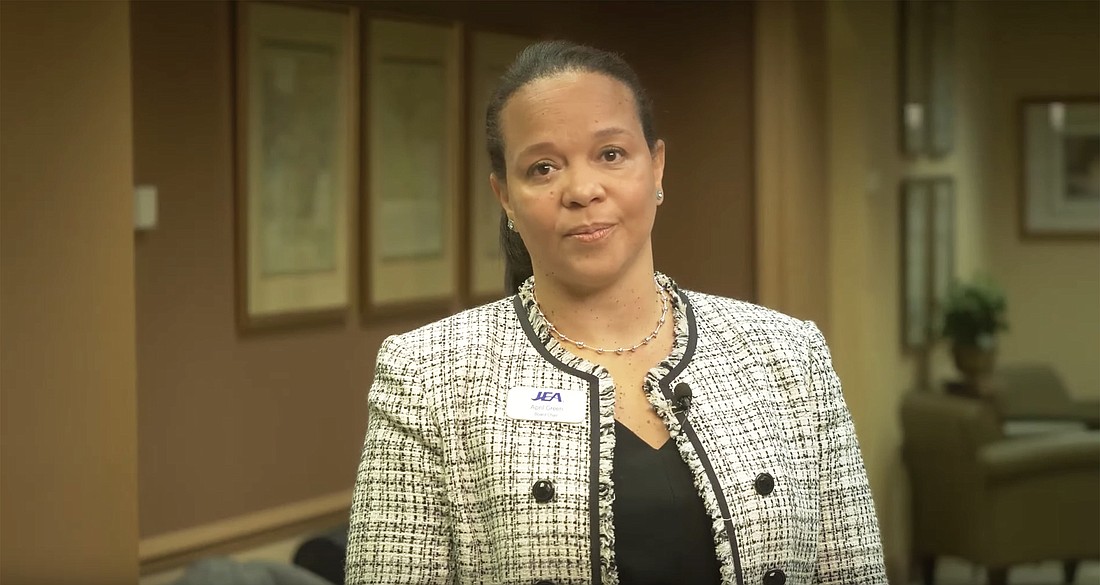
The city's chief ethics officer and JEA board Chair April Green are requesting the utility's senior leadership team voluntarily give up their severance and other fringe benefits.
Green and Carla Miller, the city's Ethics Compliance and Oversight Office director, sent a joint letter Jan. 9 to JEA's interim CEO Melissa Dykes.
It gives 11 JEA executives until noon Jan. 17 to voluntarily cancel their employment and separation agreements approved at the utility’s July 23 board meeting.
The letter states that in addition to researching issues related to public utility's now-ended moves toward privatization, Miller has been looking into the employment contracts for JEA's senior leadership team.
“The staff would continue to receive their agreed-upon salary with regular employee benefits until any further review of their position by JEA management or the board,” the letter stated.
Their request comes nearly a month after the JEA Board voted to fire former JEA CEO Aaron Zahn without cause which, based on language in his contract, could make him eligible for nearly $842,925 in severance payments.
That includes 20 weeks of pay, a 12-month consulting contract worth $634,000, and COBRA insurance payments. Zahn’s annual salary was $520,000.
The Office of General Counsel is investigating if there is evidence to fire Zahn with cause.
The contracts for 11 JEA executives, including Dykes, would make them eligible for similar benefits.
If the executives comply with the request by Miller and Green, they would forfeit:
• An $850 monthly car allowance.
• A $750-$1,600 per month Business Allowance.
• 20 weeks of termination pay.
• A three- to six-month post-employment consulting contract.
Former JEA CFO Ryan Wannemacher forfeited his termination benefits when Dykes fired him Dec. 27.
He was under pressure from City Council members for failing to reply to Council Auditor emails in August requesting more information about how the value of JEA's long-term employee performance bonus plan was forecast.
The JEA board approved the employment contracts for Zahn, Wannemacher and the 11 JEA executives as part of the same decisions that included the invitation to negotiate process that could have resulted in the sale of the utility.
The letter does not state Green's next move if the executives do not comply with the request.
“By doing this, the staff have an opportunity to increase citizens trust in JEA,” the letter said.
Becton bill targets executives, union members
Council member Danny Becton used the Green-Miller letter to try to persuade his 18 Council colleagues to pass an emergency resolution Jan. 14 with a similar goal.
Becton, who is JEA's Council liaison, introduced Resolution 2020-42 hours before the meeting to urge the JEA board to rescind all JEA employment agreements and “golden parachute” benefits related to JEA's strategic planning.
Becton's bill extends beyond the 11 executives and calls for the JEA board to reopen and renegotiate union contracts to remove language for retention payments in the event of a “recapitalization.”
If JEA was sold, the utility's board approved retention bonuses for all employees that would equal to one year's salary.
Becton's bill is a resolution and cannot force JEA to reopen the contracts. According to the general counsel's office, the union contracts are binding through 2022 and the JEA board and Council cannot force the five JEA labor unions back to the table.
Becton argues that two other strategic planning options, transitioning JEA into a community-owned cooperative or a publicly-traded company, could still be possible. Becton sees those as a form of recapitalization and could trigger the benefits.
“We never had a conversation about if this just affects privatization, or should it go into effect if we go to a co-op or an (initial public offering),” Becton said. “I think an argument could be made that a co-op option could just be an IRS reclassification where no money changed hands.
“In that event, there was no financial gain for anybody, so why should anyone, employee or not employee, gain from such a transaction?” he said.
Valerie Gutierrez, business manager for IBEW Local 2358, participated in union contract negotiations with JEA. She said reopening the contract is not necessary, arguing that the retention benefits will sunset in December 2021.
She calls Becton's bill “unfair labor practice.”
“A public sector employer cannot unilaterally reopen a (collective bargaining agreement) without our consent or without a statutorily defined exception, which there isn’t one,” Gutierrez said.
“As we stated before if there is no recapitalization this language just sits there and would not come into effect,” she said.
Becton's bill would leave in place provisions that vest all JEA employees in the pension program if they work for the utility at the time of recapitalization, as well as the three-year employment guarantee.
Becton said he was given Miller and Green's letter minutes before the Council meeting.
The emergency failed and the bill will go through the Council's committee vetting process.